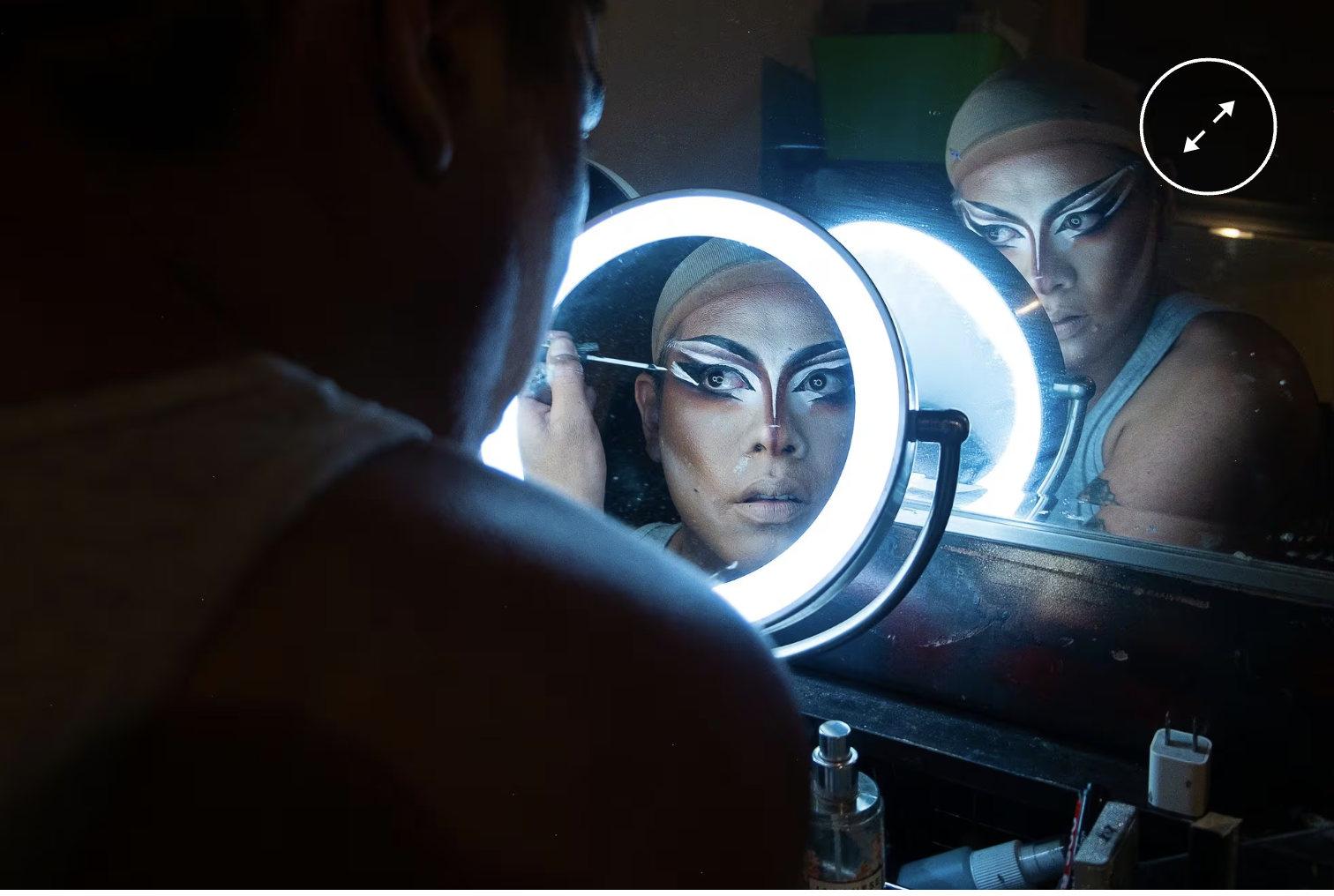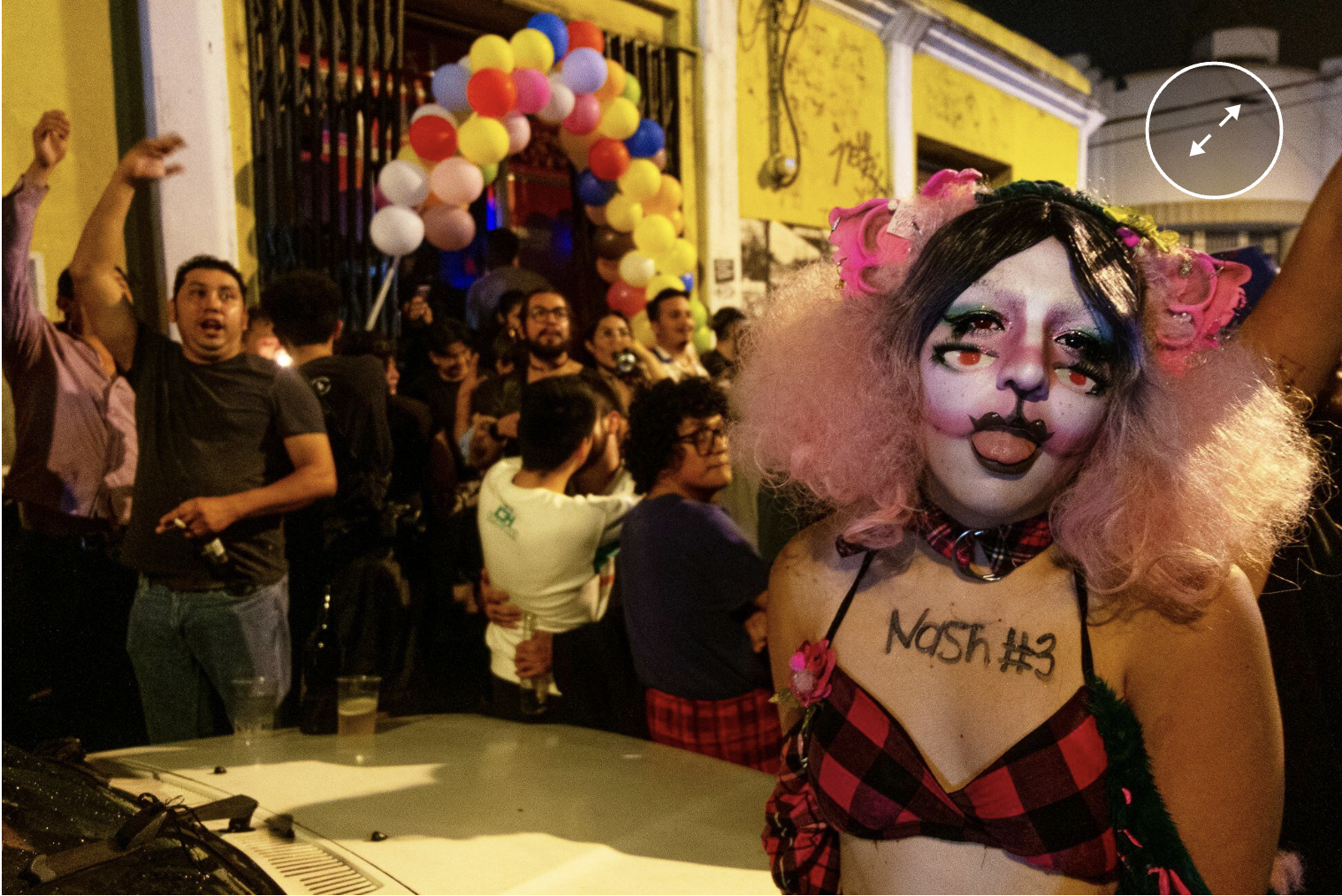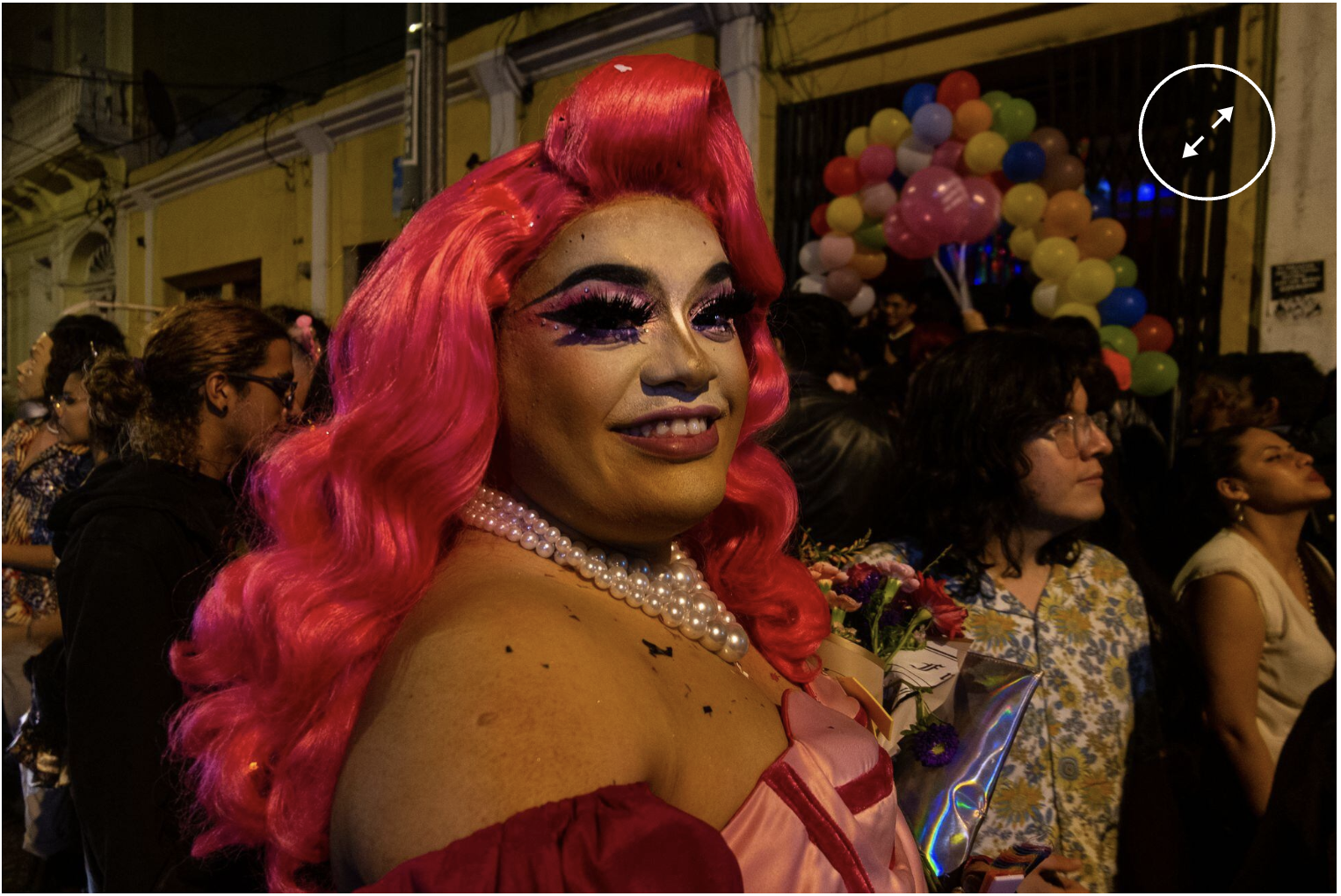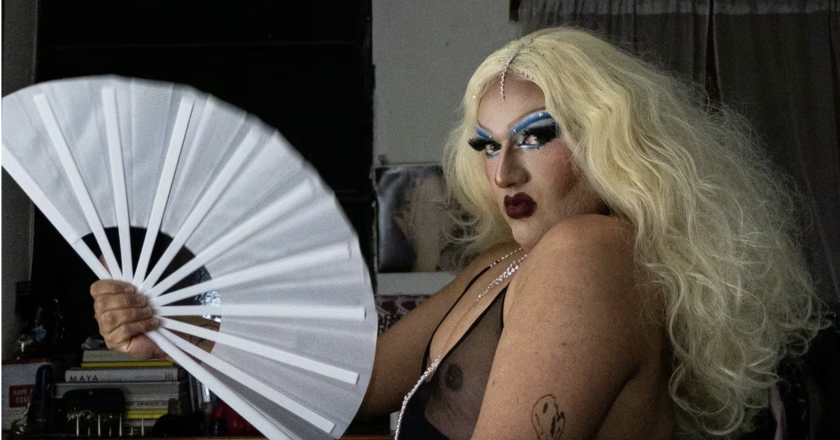“Tú te fuiste y yo me puse triple M: Más buena, más dura, más level” (You left and I went triple H: hotter, harder, higher level ….” It’s 5 p.m. on a hot day in June, and in a room in a Guatemala City apartment, the notes of Karol G. and Shakira’s latest song can be heard, a prelude to a night of partying. From a closet emerge a pair of 20-centimeter flame red heels. Several women’s suits are mixed with loose-fitting garments and men’s sneakers. Leaning against the closet, a full length mirror reflects a strong, muscular back, while, on the other side of the room, several make-up mirrors reveal a face in transformation.
Gloria Deus is 30 years old and a drag queen, or, as she puts it, “draga.” Today, Deus is preparing to participate in a contest at Shai Wa, a downtown bar that in recent times has become a space of acceptance and empowerment for the LGBTQI (lesbian, gay, bisexual, transgender, queer, and intersex) community. Three other drag queens help her put on her wig. Deus calls them “daughters” because, as a mom of choice, she had the role of introducing them to the Guatemalan drag scene.

“I started drag five years ago as an art form, a form of [political] struggle and to explore all facets of gender. I am a mixed race person and the name Gloria is a tribute to my Latin culture, but also a satire of the Catholic world. I was a strong believer, but the Church excluded me because of my nature. I tried to change, but I could no longer live like that and I left the Church. Now I feel free to enjoy both my masculine and feminine natures.”
When I started doing drag, my boss fired me. In social networks they wrote that I was disgusting and they wanted to kill me.
In another house, Andromeda, a 25-year-old drag queen, is getting ready for Dancing Queer, a dance show and art exhibition to celebrate LGBTQ+ Pride Month to which Nauxea, another well-known drag performer, invited her. Andromeda, amidst brushes, false eyebrows and brightly colored palettes, sports a black dress, a purple corset, and a wavy blonde wig. “I was accepting of being gay,” they comment, “but I’m also a non-binary person and being drag allows me to express my identity.”
Gloria Deus, Andromeda and Nauxea are three of the dozens of drag queens that have been animating the artistic and dissident scene in Guatemala City since the 1990s. In the LGBTQI spectrum they are recognized in the letter Q for “queer,” a term that has been reclaimed by part of the LGBTQ+ community to reject traditional sexual orientation and gender distinctions.
But subverting the established order often takes its toll. “Drag is political from its conception because you’re breaking the rules and when you do that, you take risks. When I started drag, my boss fired me. People wrote to me on social networks that I was disgusting and that they wanted to kill me. Despite the violence, I continue to do drag, because we and the entire LGBTQI community have the right to exist,” says Deus.
Taking to the streets as a drag queen is a political act and also an act of courage in a country that takes the life of a person for being themselves. The death of Oscar Camey, an LGBTQI activist who died on June 17 in a nightclub in Guatemala City, is one of 17 violent deaths this year in the country. If confirmed as a homophobic attack, it would add to the 67 registered hate homicides that occurred between 2020 and 2022, as identified in a report by the NGO Cristosal.

Violence in Guatemala has soared against trans women. According to the organization Otrans, 65% of trans women have been victims of physical violence, 50% have suffered sexual violence, and 40% have been arbitrarily detained by the police. There is no reliable data on the number because many trans women are registered as men at death.
Although some drag queens are trans women, most are queer people, sometimes non-binary (outside of the male or female duality) and in many cases homosexual. By assuming traits generally considered feminine, drag queens face levels of violence similar to those of cisgender women (in which sexual gender and body are in line), say researchers Alba Luz Robles Mendoza and Danae Soriano Valtierra, from the Pablo Olavide University in Seville in a report entitled, Emociones en torno a la violencia hacia las mujeres drag queen (in Spanish). And the risks are intensified by being part of the LGBTQI community.
“People whistle at you and harass you. Being on the drag strip means exposure,” says Andromeda. “Years ago, I had my face slashed in the street. I left the hospital with 17 stitches,” adds Nauxia, also a victim of violence for being gay. “Another time I was in drag and a man spat on me. Recently, a co-worker found my Instagram profile and humiliated me in front of others. I was afraid of losing my job,” they recall.
In Guatemala there is no specific legal framework condemning hate crimes. But there are laws that restrict the rights of LGBTQI people. A representative example was Law Initiative 5272 for the Protection of Life and the Family, which sought to expressly prohibit same-sex marriage and refused to recognize homophobic attacks as a hate crime. The bill, approved in March 2022, was shelved shortly thereafter due to protests. And it became an alarming symbol of the possible regression of human rights in the country.
“Being a drag queen means resisting being made politically invisibile. They don’t want to see us? Well, here we are, doing political activism with our bodies,” Gloria Deus, Andromeda and Nauxia agree. From their real and virtual platforms they fight against discrimination and defend LGBTQI rights.
“With the Drag Besties community, we organize events in safe spaces where the LGBTQI community can enjoy our shows,” Deus continues. “We also promote the Street Queens initiative to make ourselves known in public places. Sometimes we are insulted, but many young people who have not yet come out of the closet need us as an example to find courage and be free. I am happy because we are fighting hard for the recognition of LGBTQI rights,” they add.

Gloria Deus is not afraid. Neither are Andromeda and Nauxia. They balance on their stiletto heels with the look of someone who wants to conquer the world. As Andromeda goes off alone to take an Uber to her event, a group of drunken people are yelling at her. She looks straight ahead, ignoring them. Nauxia is waiting for her to start the show. A few days earlier, Gloria Deus participated in Miss Shai Wa and did not win, but that night she took over the public spaces, walking proudly as she has done hundreds of times.
“Our way of resisting homophobia and transphobia is to exist. We will never give up,” Nauxia concludes with a grimace that turns into a smile.

